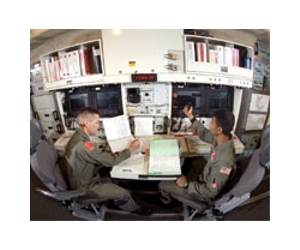 Medvedev urges US Senate to be 'responsible' on STARTLisbon (AFP) Nov 20, 2010 - Russian President Dmitry Medvedev on Saturday urged the US Senate to ratify the START nuclear arms treaty, warning that his country would withhold its own ratification until it passes in Washington. "I hope that US legislators will demonstrate a responsible approach," Medvedev told a news conference in Lisbon following the first NATO-Russia summit in more than two years. "It would be a shame" if the treaty was not ratified, he said. "We will act in symmetry to what is happening in the US," Medvedev added, indicating Russian lawmakers would only rubber-stamp the treaty after the US Senate does. Medvedev said he spoke to US President Barack Obama during the summit about efforts to convince the Senate to ratify the treaty before the end of the year. "He told me he was going to work actively in this direction with the Congress," the Russian leader said. "I hope this work will be crowned with success because if it can't move forward here then the world understandably would not become a safer place. I am convinced that common sense will triumph at the end of the day," he said. Obama has urged lawmakers to sign off on the Strategic Arms Reduction Treaty this year, before a new Congress takes over next year after Republicans routed his Democratic party in mid-term elections. European allies rallied to Obama's side during a two-day NATO summit in Lisbon, warning any delay in the ratification would endanger Europe's security. The treaty -- signed by Medvedev and Obama in April -- restricts each nation to a maximum of 1,550 deployed warheads, a cut of about 30 percent from a limit set in 2002. It would also see the return of US inspectors, who have not monitored Russia's arsenal since the agreement's predecessor lapsed in December 2009. |
The administration wants the treaty ratified before January when Republicans who won November 2 elections take their seats in a new Senate where the Democratic majority has been sharply narrowed.
James Collins, a former US ambassador to Russia who now heads the Carnegie Endowment for International Peace's Russia and Eurasia program, said it's too early to predict what will happen to the treaty.
"But I do think that there's no question that a failure to ratify START in the (current) lame-duck session is going to be seen as a setback for US-Russia relations," Collins said.
In Moscow, it will strengthen "the hands of those who have questioned the reset from the beginning, those who are probably critical of what the Russian government has been doing with us on Iran, on Afghanistan and so forth," he said.
"It will just be harder to have the trust that seems to have been building between the Americans and the Russians that has made it much easier to get common ground on some of these other issues," he said.
Since it took office in January last year, the Obama administration has enjoyed what it calls a "reset" in US relations with Moscow which plunged to a low with the Russian military intervention in Georgia in August 2008.
For example, Russia voted for a tough fourth round of UN Security Council sanctions that was imposed on Iran in June over its nuclear program, which Western powers fear masks a drive for a weapon.
Russia also scrapped a deal to supply S-300 ground-to-air missiles to Iran.
In Afghanistan, the United States and Russia have also stepped up cooperation. Under a deal signed last year, Russia allows US military planes to fly through its air space with supplies for the war zone.
In his weekly radio address, Obama hit the same points.
"Without ratification, we put at risk the coalition that we have built to put pressure on Iran, and the transit route through Russia that we use to equip our troops in Afghanistan," the president continued.
Linton Brooks, a former US under secretary of energy for nuclear security, expressed more general concern over the fallout on US foreign policy if the treaty is not ratified or delayed.
"Anytime the United States makes a major commitment and is unable to deliver, then the US overall ability to influence the international system is weakened," Brooks said in a conference call with journalists.
And although the treaty is very specific -- it cuts US and Russian long-range nuclear stockpiles and provides for mutual monitoring -- it could complicate the Obama administration's broader nuclear arms control agenda.
"The path through anything runs through ratification of New START," including that of hoped-for negotiations to control Russian tactical or so-called battlefield nuclear weapons, he said.
"The path to helping convince China to continue to maintain its minimum deterrent and not try to build up runs through New START," Brooks said in the conference call hosted by The Consensus for American Security.
For Obama, failure to ratify jeapordizes the foundation of arms control.
"And without ratification, we risk undoing decades of American leadership on nuclear security, and decades of bipartisanship on this issue," Obama said in his radio address.
Writing in the Daily Beast, Leslie Gelb expressed fears that the Republicans seem bent on killing the treaty in order to deny Obama a political victory.
Killing START "would totally undermine Moscow's faith in Washington's ability to carry out negotiated agreements," wrote Gelb, a former New York Times columnist and senior government official.
"It, thus, would undermine the administration's ability to strengthen ties with Moscow, to find common ground to deal with the problems of the Middle East and South Asia -- very serious problems indeed," he said.
"It would also encourage others to doubt Washington's ability to keep its word," he argued.
"It would undermine American efforts to convince signatories to the Non-Proliferation Treaty that the United States had a serious intent to reduce its nuclear weapons. And this, in turn, would only increase those countries' incentives to go nuclear."
No comments:
Post a Comment